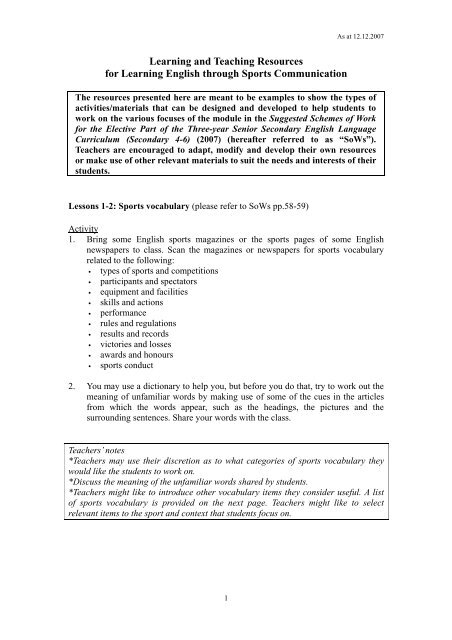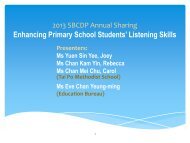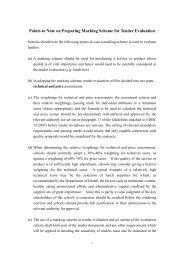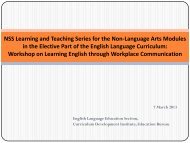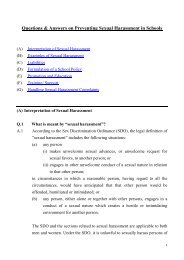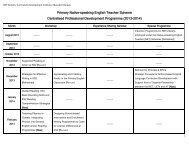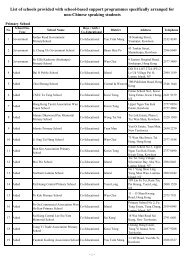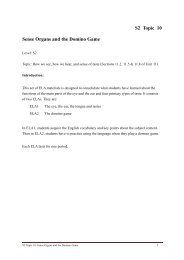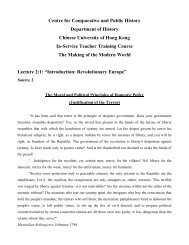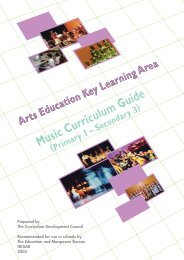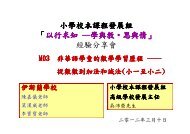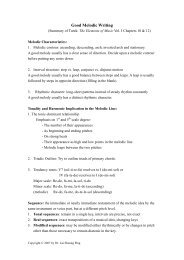Sports Communication
Sports Communication
Sports Communication
Create successful ePaper yourself
Turn your PDF publications into a flip-book with our unique Google optimized e-Paper software.
Learning and Teaching Resources<br />
for Learning English through <strong>Sports</strong> <strong>Communication</strong><br />
1<br />
As at 12.12.2007<br />
The resources presented here are meant to be examples to show the types of<br />
activities/materials that can be designed and developed to help students to<br />
work on the various focuses of the module in the Suggested Schemes of Work<br />
for the Elective Part of the Three-year Senior Secondary English Language<br />
Curriculum (Secondary 4-6) (2007) (hereafter referred to as “SoWs”).<br />
Teachers are encouraged to adapt, modify and develop their own resources<br />
or make use of other relevant materials to suit the needs and interests of their<br />
students.<br />
Lessons 1-2: <strong>Sports</strong> vocabulary (please refer to SoWs pp.58-59)<br />
Activity<br />
1. Bring some English sports magazines or the sports pages of some English<br />
newspapers to class. Scan the magazines or newspapers for sports vocabulary<br />
related to the following:<br />
․ types of sports and competitions<br />
․ participants and spectators<br />
․ equipment and facilities<br />
․ skills and actions<br />
․ performance<br />
․ rules and regulations<br />
․ results and records<br />
․ victories and losses<br />
․ awards and honours<br />
․ sports conduct<br />
2. You may use a dictionary to help you, but before you do that, try to work out the<br />
meaning of unfamiliar words by making use of some of the cues in the articles<br />
from which the words appear, such as the headings, the pictures and the<br />
surrounding sentences. Share your words with the class.<br />
Teachers’ notes<br />
*Teachers may use their discretion as to what categories of sports vocabulary they<br />
would like the students to work on.<br />
*Discuss the meaning of the unfamiliar words shared by students.<br />
*Teachers might like to introduce other vocabulary items they consider useful. A list<br />
of sports vocabulary is provided on the next page. Teachers might like to select<br />
relevant items to the sport and context that students focus on.
oo<br />
breakpoint<br />
buzzer-beater<br />
championship<br />
cheer<br />
clinch<br />
clinical<br />
coach<br />
comeback<br />
commentator<br />
cushioning<br />
defeat<br />
draw<br />
dribble<br />
durable<br />
equaliser<br />
error-ridden<br />
fair play<br />
fencing<br />
flawless<br />
fluke<br />
foul<br />
List of sports vocabulary<br />
Grand Prix<br />
gymnastics<br />
home and away<br />
hoop<br />
humbled<br />
in-form/out-of-form<br />
injury<br />
knockout<br />
linesman<br />
lopsided<br />
offside<br />
on fire<br />
overpower<br />
penalty<br />
performance<br />
pitch<br />
playoff<br />
racket<br />
rebound<br />
referee<br />
relegation<br />
rink<br />
2<br />
As at 12.12.2007<br />
rookie<br />
scoreboard<br />
sensational<br />
skateboarding<br />
stadium<br />
substitute<br />
sumo<br />
suspension<br />
tackle<br />
titleholder<br />
topspin<br />
tournament<br />
track<br />
trophy<br />
winning/losing<br />
streak<br />
wrestling
Lessons 3-6: Fan talk (please refer to SoWs pp.58-59)<br />
Activity 1<br />
Study the following texts and discuss the following with a partner:<br />
1. For what purpose(s) do you think the texts are written?<br />
2. Do you like reading them? Why or why not?<br />
3. How do the writers try to make the texts interesting?<br />
4. Where can you find texts like these in real life?<br />
3<br />
As at 12.12.2007<br />
Text 1<br />
Leon Gruber – some interesting facts<br />
- Leon was born in the same house as the great footballer Guy Rainer<br />
- Leon’s first word, according to his mother, was ‘ball’<br />
- Leon won his first football award at the age of 6<br />
- Leon’s nickname at school was Pele<br />
- Leon’s favourite food is frankfurters<br />
- As a teenager Leon would only play in one special pair of football boots that he<br />
said brought him luck – eventually they fell to pieces, but he still went on winning<br />
- Leon has been Footballer of the Year four times, a record<br />
Text 2<br />
When was the team founded?<br />
Abacus United first played in 1936. They were started by a group of school friends<br />
who did not know they were starting one of the greatest clubs in the world.<br />
How many times have they won championships?<br />
More than we can count, including eight European championships and twenty<br />
national ones.<br />
Who has been their greatest player?<br />
Well, you can definitely argue about that as there have been so many great ones, but<br />
the fans of the club have voted Giovanni Luigi as the all-time greatest.<br />
Why is there an apple on their badge?<br />
The area they come from is famous for its apples.<br />
Text 3<br />
Amin Patel is probably the greatest cricketer of our time. He has attracted thousands<br />
of fans to the game with his star quality and good sportsmanship. He has used his<br />
fame to help improve the world. His foundation has given an education to many<br />
children who would not have received one except for Amin. He is a great bowler and<br />
one of the greatest batsmen of all time. He even catches with incredible skill. For all<br />
these reasons I deeply admire Amin and dedicate this website to him.<br />
Text 4<br />
Welcome to my fan site. If my fans are genuine in following me, I hope they will listen<br />
to some words of advice from me. Basketball should be a clean game. There should be<br />
no drugs involved. Players should keep themselves healthy and never smoke. We play<br />
to win and being competitive is good, but we lose with grace. Anger and violence<br />
have nothing to do with sport. I had a hard childhood and have met a lot of racism,<br />
but that’s not going to make me behave badly. I respect myself and by my hard work<br />
and training I now have the respect of many others. And one last thing: make sure you<br />
always enjoy yourself when you play the great game of basketball!
Text 5<br />
Profile of Kim Hyo-sok<br />
Statistics:<br />
Goals scored 86<br />
Fouls 2<br />
Yellow cards 4<br />
Red cards 1<br />
4<br />
As at 12.12.2007<br />
Kim Hyo-Sok is a midfield player with a powerful shot.<br />
Kim Hyo-sok joined Inchon in 2002 and has become one of their most reliable and<br />
regular players.<br />
His best goal was in the national final in 2004 when he headed the ball into the net at<br />
the last moment and gave his team victory.<br />
Kim Hyo-sok is also a fine golf player and could have had a career as a professional.<br />
It is thought he may be made captain at Inchon next season.<br />
Text 6<br />
Cheryl Lam is one of our greatest tennis players. Her strokes are of incredible power,<br />
but she relies on her skill more than her strength. Her fans call her the Princess.<br />
Certainly she is a royal player, but Empress might be even more suitable as there is no<br />
one above her. She was coached from childhood to be a great player. Her parents<br />
devoted themselves to bringing her full potential out into the open. She admits it was<br />
hard spending so much time practising, but believes her parents had her best interests<br />
at heart. Cheryl has won almost every tennis championship there is, but is proudest of<br />
winning Wimbledon five years in a row. Her only fear is of injury as she has seen<br />
many tennis players suffer from serious muscle problems.<br />
Activity 2<br />
Choose a sports player or team you like and write a piece of fan material for him/her/<br />
them like one of the examples above. You might like to take the following steps:<br />
․ Make a list of what you know about the player or team. Gather more information<br />
if necessary.<br />
․ Decide on the type of text you would like to produce. You may refer to the above<br />
examples or the list of websites on the next page.<br />
․ Write the fan material and show it to a classmate for feedback.
List of websites with fan material<br />
1. The major sports clubs and leagues have large websites catering for fans:<br />
․ www.manutd.com/home/default.sps<br />
․ www.letour.fr/indexus.html<br />
․ www.nba.com<br />
2. A site for a sport and its stars:<br />
․ www.soccer-corner.com/Players.htm<br />
3. Sites for individual players:<br />
․ www.shinji-ono.tv/eng/index.html<br />
․ www.maria-sharapova.org<br />
․ www.ianthorpe.aol7.com.au/fountainforyouth.php<br />
․ www.golfstarsonline.com/W/Tiger_Woods/Fan_sites/<br />
․ liuxiang.sports.cn/english/index.html<br />
․ www.yaomingfanclub.com/<br />
5<br />
As at 12.12.2007
Lessons 9-14: Presentation on sports (please refer to SoWs pp.60-61)<br />
6<br />
As at 12.12.2007<br />
Activity<br />
Form groups of three to four. From the list of sports on the next page, choose one that<br />
your group is interested in. Prepare a short presentation to introduce the sport to your<br />
classmates. You should collect the necessary information. This is a short presentation<br />
and you will not require a great deal of detail. Organise the material and concentrate<br />
on the most interesting points. Your presentation may include:<br />
․ a brief introduction<br />
․ basic information on the sport<br />
․ the sport’s popularity<br />
․ the pleasures of the sport<br />
․ the dangers of the sport<br />
․ closing comments<br />
Share out the points among your group mates.<br />
(Before you make the presentation, you might like to refer to the suggested plan, the<br />
presentation guidelines and the presentation feedback form on pp.8-10 for the areas<br />
you would need to pay attention to.)
1. badminton<br />
2. baseball<br />
3. basketball<br />
4. bowling<br />
5. boxing<br />
6. car racing<br />
7. cricket<br />
8. cycling<br />
9. diving<br />
10. fencing<br />
11. field athletics<br />
12. football<br />
13. golf<br />
14. gymnastics<br />
15. hockey<br />
16. ice hockey<br />
17. ice skating<br />
18. judo<br />
19. kung fu<br />
20. karate<br />
List of sports<br />
7<br />
21. marathon running<br />
22. mountaineering<br />
23. rugby<br />
24. sailing<br />
25. skateboarding<br />
26. skiing<br />
27. snooker<br />
28. softball<br />
29. squash<br />
30. sumo<br />
31. surfing<br />
32. swimming<br />
33. table-tennis<br />
34. tae kwon do<br />
35. tennis<br />
36. track athletics<br />
37. volleyball<br />
38. water-polo<br />
39. weightlifting<br />
40. wind surfing<br />
You may select a sport from outside the list for presentation.<br />
As at 12.12.2007
A suggested plan with guiding questions<br />
8<br />
As at 12.12.2007<br />
When planning your presentation, you might like to consider the following:<br />
1. Introduction. Interesting opening comments to attract the audience’s attention.<br />
2. Basic information on the sport. Is it an individual or team event? What<br />
equipment is needed? How and where is it played? What is the aim of the sport?<br />
Who controls its rules?<br />
3. The sport’s popularity. Is the sport played by a lot of people and in many<br />
countries? Where can the sport be watched? Who watches it? Who/What are<br />
some famous players/teams/events? What kind or amount of support do they get<br />
from the fans?<br />
4. The pleasures of the sport. What makes it enjoyable? What skills does it call<br />
upon? If possible, be personal.<br />
5. The dangers of the sport. What sort of injuries (if any) may be risked? What<br />
abuses take place in relation to the sport?<br />
6. Closing comments. Encourage interest in the sport.
Presentation guidelines<br />
9<br />
As at 12.12.2007<br />
1. Do not read from your script or it will sound unnatural. Put a few headings on<br />
cards you can hold easily and glance quickly at as you talk. e.g.<br />
THE WILLIAMS SISTERS<br />
WIMBLEDON<br />
THE US OPEN<br />
2. Practise your presentation. Make sure it is the right length and that you have time<br />
to cover all your points.<br />
3. You will be given feedback under the following headings:<br />
․ Content (Is the information suitable? Is the information interesting?)<br />
․ Organisation (Are the ideas well-connected?)<br />
․ Language (Are the words said correctly? Are the sentences well-formed with<br />
suitable tenses?)<br />
․ Delivery strategies (Is the speech given in a natural way and without much<br />
hesitation? Can the words be heard clearly? Is there enough eye contact? Are<br />
suitable body movements used?)<br />
․ Collaboration with group mates (How well do group mates cooperate in<br />
presenting the message?)
Presentation Feedback Form<br />
10<br />
As at 12.12.2007<br />
Give feedback on your own and/or your classmates’ performance by<br />
circling the appropriate number.<br />
Content<br />
• The information is suitable<br />
• The information is interesting<br />
Organisation<br />
• The ideas are well-connected<br />
Language<br />
• Words are said correctly<br />
• Sentences are well-formed (e.g. with suitable tenses)<br />
Delivery strategies<br />
• The speech is given in a natural way and without much<br />
hesitation<br />
• Words can be heard clearly<br />
• There is enough eye contact<br />
• Suitable body movements are used<br />
Collaboration with group mates<br />
• Group mates cooperate well in presenting the message<br />
Other Comments:<br />
Needs<br />
improvement<br />
1<br />
1<br />
1<br />
Satisfactory Good<br />
Teachers’ notes<br />
*Teachers are encouraged to adapt this form by making additions or deletions,<br />
where appropriate, to suit students’ needs and level.<br />
1<br />
1<br />
1<br />
1<br />
1<br />
1<br />
1<br />
2<br />
2<br />
2<br />
2<br />
2<br />
2<br />
2<br />
2<br />
2<br />
2<br />
3<br />
3<br />
3<br />
3<br />
3<br />
3<br />
3<br />
3<br />
3<br />
3
Lessons 15-18: <strong>Sports</strong> advertising (please refer to SoWs pp.60-61)<br />
11<br />
As at 12.12.2007<br />
Activity 1<br />
Bring some advertising material for your favourite sports product to class. In small<br />
groups, briefly introduce your material to each other and then discuss the following:<br />
1. What are the main features or selling points of the advertisements (e.g.<br />
endorsement by star players, health benefits, improved performance, physical<br />
perfection, ‘coolness’)?<br />
2. Is the use of language effective? Why or why not? (You might like to consider<br />
the use of repetition, positive adjectives, slogans, rhetorical questions, etc.)<br />
Activity 2<br />
Choose a sports product (e.g. a new sports drink, a new pair of trainers, a new squash<br />
racquet) and produce an advertising leaflet for it. Try to make the leaflet as interesting<br />
and effective as possible through the use of language, sales techniques and artwork.
Lessons 19-22: <strong>Sports</strong> product review (please refer to SoWs pp.60-61)<br />
12<br />
As at 12.12.2007<br />
Activity 1<br />
Work with a partner. You read one of the following product reviews and your partner<br />
reads the other. Discuss the following after the reading:<br />
1. What are the criteria for choosing the products?<br />
2. How helpful are the articles to the consumers? Is one more helpful than the other?<br />
Give reasons to support your answers.<br />
Article One<br />
When you choose a skateboard there are a number of things you need to think about.<br />
You need to judge your own skill, the places you will use your board and the image<br />
you want. When you have thought about those things, you can start looking at some<br />
skateboards. First you must choose how wide you want it to be. If you are a beginner<br />
you may want a wider board than someone who likes to do sharp turns and tricks. The<br />
size and hardness of the wheels are important too. Bigger wheels go faster but you<br />
need smaller ones for flips and turns. Soft ones give you a smooth ride; hard ones are<br />
more stable. Boards are different heights above the ground. They have different<br />
strengths and shapes. They use different materials and come in different colours. Then<br />
finally there is the question of price.<br />
I looked at the Ace 4 Board. This is a beautiful board for someone with access to real<br />
board parks. It is state of the art but far too expensive for the average boarder in<br />
Hong Kong. The Mark 13 is cheap and I am told breaks easily. I recommend for most<br />
Hong Kong boarders the Alpha Y – it is strong but light; it turns well and it moves fast.<br />
It falls in the medium-priced range and comes in a number of nice designs and<br />
colours. The Alpha Y won’t let you down.<br />
Article Two<br />
When you choose a bicycle you need to ask yourself what you want to use it for.<br />
Someone carrying a lot of things on it will want a heavy, strong bike. If you are going<br />
to ride all over Hong Kong for sport and exercise, you will need a mountain bike with<br />
gears. Faster bicycles can be uncomfortable if you ride them for long. So are you<br />
road racing, touring or just enjoying yourself? When choosing a bike you need to look<br />
at its weight, its strength, its design, its saddle comfort, its accessories, its materials<br />
and its price. My favourite bicycle for someone in Hong Kong who is serious but not<br />
too serious about cycling is the Leopard U8. It is made from titanium and is strong<br />
and flexible, but does not need too much maintenance and cleaning. It moves<br />
smoothly and is very stable though it can be a bit slow to respond at times. I find it<br />
comfortable and you do not have to be a millionaire to buy one.<br />
Activity 2<br />
Think of a sports product (e.g. balls, sports shoes, racquets and bats for different<br />
sports, sportswear, goggles) you have purchased at some time or would like to buy in<br />
the near future. Think about why you favour a particular model. Make a list of as<br />
many criteria as possible on which to judge the product. Then, based on these criteria,<br />
write a consumer review for the product. You may compare one model with another if<br />
you think that will be more helpful to your readers.<br />
You may use the articles above as examples, or browse the following websites for
more ideas:<br />
www.reviewcentre.com/consumer_reviews6.html<br />
www.tenniscompany.com/ABOUT7.html<br />
www.thedietchannel.com/Energy-Bars.htm<br />
13<br />
As at 12.12.2007
Lessons 23-26: Films on sports (please refer to SoWs pp.60-61)<br />
Suggested titles<br />
․ Bagger Vance [golf]<br />
․ Bend it like Beckham [football]<br />
․ Chariots of Fire [running]<br />
․ Field of Dreams [baseball]<br />
․ Friday Night Lights [American football]<br />
․ Hoop Dreams [basketball]<br />
․ Hoosiers [basketball]<br />
․ Jerry McGuire [American football]<br />
․ A League of Their Own [baseball]<br />
․ One Million Dollar Baby [boxing]<br />
․ Remember the Titans [American football]<br />
․ The Rookie [baseball]<br />
․ Seabiscuit [horse racing]<br />
․ Searching for Bobby Fischer [chess]<br />
․ Swimming Upstream [swimming]<br />
․ Tin Cup [golf]<br />
․ Wimbledon [tennis]<br />
14<br />
As at 12.12.2007
15<br />
As at 12.12.2007<br />
Lessons 27-28: Preparing for the final display (please refer to SoWs pp.62-63)<br />
List of suggested topics<br />
․ Students’ sports participation, preferences and consumption<br />
․ <strong>Sports</strong> records and achievements of the school/past students<br />
․ Major sports events or tournaments of the school<br />
․ <strong>Sports</strong> development of the school<br />
․ Individual teams and players<br />
Suggested genres/formats<br />
․ Personal profiles<br />
․ Interview reports<br />
․ Match/tournament reviews<br />
․ Charts and tables<br />
․ Survey reports<br />
․ Captions of photographs and pictures<br />
․ Feature articles
Lessons 43-46: Major sports events (please refer to SoWs pp.64-65)<br />
16<br />
As at 12.12.2007<br />
Activity<br />
Think of a major sports event you are interested in – tournaments, cup competitions,<br />
Grand Prix races, etc. around the world. Gather information about the event as<br />
preparation for a short presentation. In the presentation you should:<br />
․ name the event and say which sport it relates to<br />
․ give a brief history of the event<br />
․ describe what it is like and what happens<br />
․ discuss its commercial impact – sectors of the community/society, associated<br />
business, etc.<br />
․ give some information about the last time it was held<br />
․ tell people how to learn more, and when and how they can enjoy the next one<br />
Most major sports events have websites dedicated to them. You may refer to them for<br />
ideas. Here are some examples:<br />
www.formula1.com<br />
www.hksevens.com<br />
www.premierleague.com<br />
www.nba.com<br />
www.nfl.com<br />
www.australianopen.org<br />
www.rolandgarros.org<br />
www.usopen.org<br />
www.wimbledon.org<br />
www.americascup.com/en/
Presentation Feedback Form<br />
17<br />
As at 12.12.2007<br />
Give feedback on your own and/or your classmates’ performance by<br />
circling the appropriate number.<br />
Content<br />
• The information is suitable<br />
• The information is interesting<br />
Organisation<br />
• The ideas are well-connected<br />
Language<br />
• Words are said correctly<br />
• Sentences are well-formed (e.g. with suitable tenses)<br />
Delivery strategies<br />
• The speech is given in a natural way and without much<br />
hesitation<br />
• Words can be heard clearly<br />
• There is enough eye contact<br />
• Suitable body movements are used<br />
Collaboration with group mates<br />
• Group mates cooperate well in presenting the message<br />
Other Comments:<br />
Needs<br />
improvement<br />
1<br />
1<br />
1<br />
Satisfactory Good<br />
Teachers’ notes<br />
*Teachers are encouraged to adapt this form by making additions or deletions<br />
where appropriate, to suit students’ needs and level.<br />
1<br />
1<br />
1<br />
1<br />
1<br />
1<br />
1<br />
2<br />
2<br />
2<br />
2<br />
2<br />
2<br />
2<br />
2<br />
2<br />
2<br />
3<br />
3<br />
3<br />
3<br />
3<br />
3<br />
3<br />
3<br />
3<br />
3


